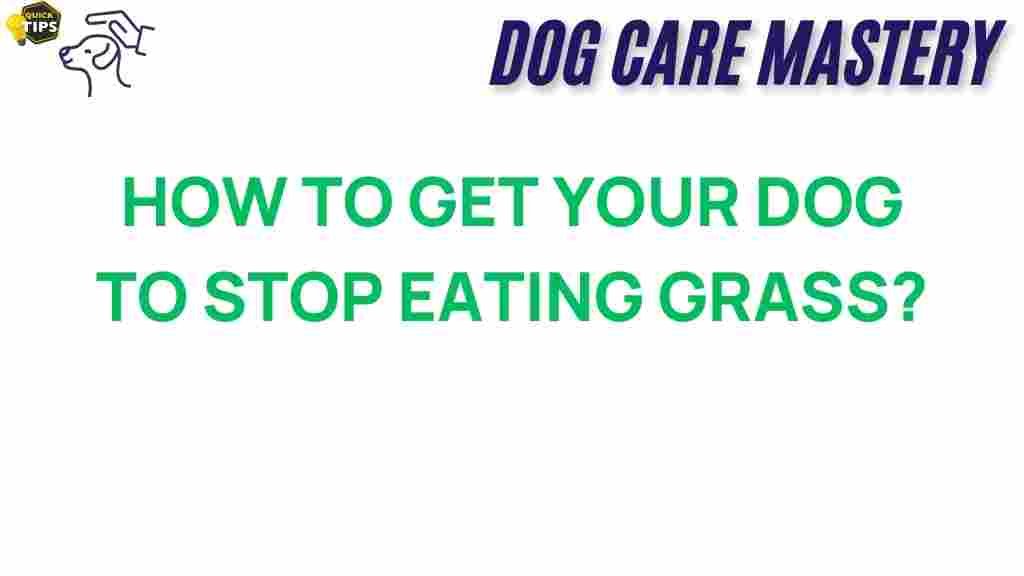Understanding Dog Behavior: Why Does Your Dog Eat Grass?
As a dog parent, you may have witnessed your furry friend munching on grass during your daily walks or in your backyard. This peculiar behavior often raises questions and concerns among pet owners. Is it normal? Should you be worried? In this article, we will delve into the reasons behind this common dog behavior, explore the possible motivations for eating grass, and provide you with tips on how to manage it effectively.
The Commonality of Grass-Eating in Dogs
First and foremost, it’s essential to understand that grass-eating is a widespread behavior among dogs. Studies suggest that up to 80% of dogs may eat grass at some point in their lives. This behavior can be perplexing, especially since dogs are primarily carnivorous. However, there are several theories that attempt to explain this phenomenon.
Reasons Why Dogs Eat Grass
There are a variety of reasons why dogs exhibit this grass-eating behavior. Let’s explore some of the most common motivations:
- Instinctual Behavior: Some experts believe that eating grass is a natural instinct inherited from their ancestors. Wild canines would consume the stomach contents of herbivorous prey, which often included grass and plants.
- Dietary Deficiency: Dogs may eat grass to compensate for a lack of certain nutrients in their diet. If your dog is not getting enough fiber or specific vitamins, they might turn to grass as a natural source.
- Digestive Aid: Some dogs eat grass to induce vomiting. If they feel nauseous or have an upset stomach, grass can help them expel the contents of their stomach. However, it’s essential to monitor if this becomes a frequent occurrence.
- Attention-Seeking Behavior: Dogs are social animals, and sometimes, they may eat grass to attract attention from their owners. If your dog notices that you react strongly when they eat grass, they may repeat the behavior to get a reaction.
- Boredom or Anxiety: Just like humans, dogs can experience boredom or anxiety. Eating grass may serve as a coping mechanism to relieve stress or boredom.
Step-by-Step Process: How to Determine the Cause
To better understand your dog’s specific grass-eating behavior, you can follow this step-by-step process:
Step 1: Observe Your Dog’s Behavior
Pay attention to when and how often your dog eats grass. Is it during walks, at home, or only at certain times of the day? Noting these patterns can help identify triggers.
Step 2: Check Their Diet
Evaluate your dog’s diet to ensure they are getting the proper nutrition. Consult with your veterinarian to determine if your dog’s food meets their dietary needs and contains adequate fiber.
Step 3: Monitor for Other Symptoms
If your dog frequently vomits after eating grass or shows signs of distress, such as lethargy or loss of appetite, it’s crucial to consult your veterinarian. These could be signs of underlying health issues.
Step 4: Provide Mental and Physical Stimulation
If boredom or anxiety seems to be a factor, consider increasing your dog’s mental and physical activities:
- Engage in regular playtime.
- Incorporate training sessions to stimulate their mind.
- Introduce puzzle toys to keep them entertained.
Step 5: Redirect Their Attention
If your dog eats grass as a way to seek attention, try redirecting their focus with toys or treats. Reward them for engaging in alternative behaviors.
Troubleshooting Tips for Grass-Eating Behavior
If your dog continues to eat grass despite your best efforts, consider the following troubleshooting tips:
Consult a Veterinarian
If you have ruled out dietary deficiencies and behavioral issues, it’s best to consult a veterinarian. They can provide professional advice tailored to your dog’s specific health needs.
Avoid Toxic Plants
Ensure that your dog is not eating grass or plants that could be toxic. Some common garden plants can be harmful. Familiarize yourself with toxic plants for dogs to keep your pet safe.
Keep Them on a Leash
If your dog has a tendency to eat grass during walks, consider keeping them on a leash to help prevent this behavior until you can address it.
Provide a Safe Alternative
Consider providing your dog with safe, dog-friendly plants or grass to chew on. This can satisfy their urge to munch while keeping them away from harmful vegetation.
Conclusion: Understanding Your Dog’s Behavior
While it can be puzzling to witness your dog eating grass, most of the time, it is a normal aspect of dog behavior. Understanding the reasons behind this behavior—from instinctual habits to dietary needs—can help you address any concerns effectively. By observing your pet, ensuring a balanced diet, and providing mental stimulation, you can manage this behavior and enhance your dog’s overall well-being.
In summary, whether your dog eats grass out of instinct, for dietary reasons, or due to boredom, being proactive can make all the difference. If you notice concerning signs or behaviors, don’t hesitate to reach out to your veterinarian for guidance. Remember, a happy and healthy dog is a well-cared-for dog!
For more information on dog behavior and health, explore our resources or check out this comprehensive guide on dog nutrition.
This article is in the category Behavior and created by dogcaremastery Team
